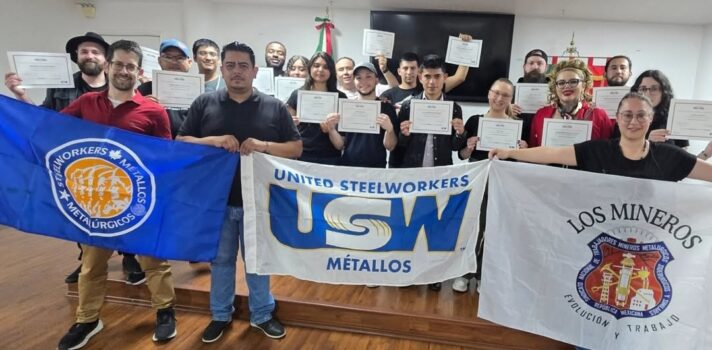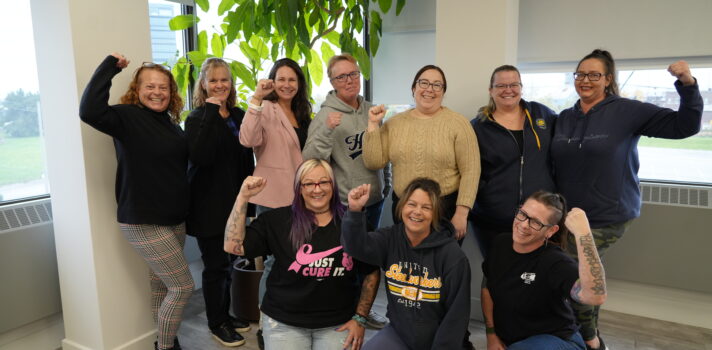TORONTO – A cross-Canada awareness campaign is under way to find elderly former miners and their surviving family members who could be entitled to potentially life-changing compensation for industrial disease.
The campaign stems from a ground-breaking decision by the Ontario government to finally recognize Parkinson’s disease as a compensable occupational illness linked to the use of so-called McIntyre Powder in the province’s mining industry for several decades.
The Ontario government’s decision will make it much easier for former miners and their families to file workers’ compensation claims and to receive payment from the province’s Workplace Safety and Insurance Board (WSIB).
“These will be the simplest occupational disease claims we’ve seen in decades,” said Marty Warren, Canadian director of the United Steelworkers union (USW).
“It’s important for former miners and their families to know that if they file claims, it’s not going to be the typical workers’ compensation hassle they may have heard about in the past. So it is crucial that people know about this,” Warren said.
The USW and other workers’ advocacy groups lobbied for years for the Ontario government to recognize that medical evidence demonstrated a direct link between Parkinson’s disease in miners and their exposure to McIntyre Powder.
McIntyre Powder was an aluminum-based inhalant used between 1943 and 1979 in mines and other industries where workers might be exposed to silica dust. The theory, eventually proved false, was that inhaling the finely ground aluminum powder would protect workers’ lungs. Instead, it made workers sick, and led to many deaths.
Thousands of Ontario miners were compelled to inhale McIntyre Powder during the 36-year period it was in use.
“There was no such thing as informed consent. Submitting to the aluminum dust inhalation ‘therapy’ was a condition of employment,” says Janice Martell, a miner’s daughter who founded the McIntyre Powder Project in 2015 to advocate for her father and other miners exposed to the toxic dust.
Martell’s father, Jim Hobbs, was required to inhale McIntyre Powder at the beginning of every shift while working at a uranium mine in Elliot Lake, Ont. He later contracted Parkinson’s disease and died in 2017 without having received workers’ compensation benefits.
A race against the clock
Now that the Ontario government has recognized Parkinson’s as a compensable workplace illness, time is of the essence to find miners or their surviving family members who are eligible for compensation.
“There is an element of racing against the clock in many of these cases,” says Martell.
“It’s been 43 years since McIntyre Powder was last used in the mining industry, so virtually all of the miners suffering from Parkinson’s, or the surviving spouses of deceased miners, are of advanced age,” she notes.
“Most of these people will be unaware that they are now eligible for compensation, and that it can be substantial in many cases. Many of them are undoubtedly struggling financially, so this can have a significant impact on their lives.”
Neither the Ontario government nor the WSIB is attempting to track down former miners or their surviving family members who may be eligible for compensation. As a result, the USW, the McIntyre Powder Project and the Occupational Health Clinics for Ontario Workers (OHCOW) are reaching out to news media, labour and other advocacy groups across the country to disseminate the information to try to reach as many potential claimants as possible.
“Over the years these former Ontario miners and their surviving family members have likely settled in communities across Canada, and beyond,” says Myles Sullivan, USW Director for Ontario and Atlantic Canada.
“We will do everything we can to reach out to these people to make them aware that this compensation is available to them, and that they deserve it,” Sullivan says.
For information on the claims process, former miners and surviving family members can contact Janice Martell of the McIntyre Powder Project, at 1-800-461-7120, minersinfo@yahoo.ca.
VIEW THE BACKGROUNDER:
Marty Warren, USW National Director, 416-544-5951
Myles Sullivan, USW District 6 Director, 416-243-8792
Janice Martell, McIntyre Powder Project, 1-800-461-7120, minersinfo@yahoo.ca
Sylvia Boyce, USW District 6 Health and Safety Co-ordinator, 905-741-9830, sboyce@usw.ca
Denis St. Pierre, USW Communications, 647-522-1630, dstpierre@usw.ca
Share on Facebook



